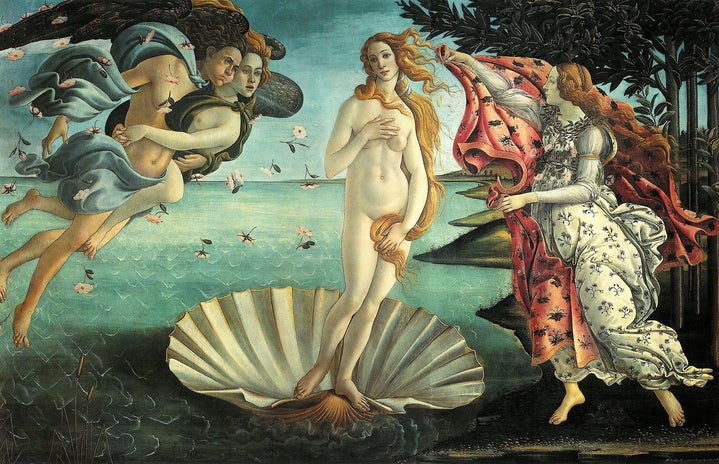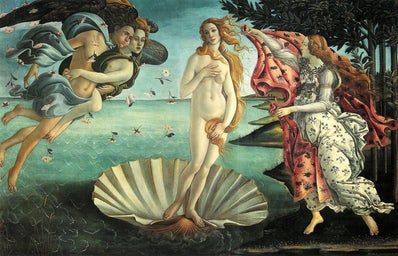Love is in the air! Or at least it should be…
Even though the concept of Valentine’s Day as a holiday specifically for lovers is relatively new here in Finland, there are those who happily ignore the rather emotionally tepid Finnish translation of the holiday “Ystävänpäivä” (engl. “Friend’s Day”), choosing, rather, to fully embrace the one day a year set aside for the declaration and celebration of icky-sticky-love. Therefore, I can’t think of a better topic to discuss during this Valentine’s season than that of the origin of what is said to be the most powerful emotion known to man. Well, the origin according to the ancient Greeks, that is. Love, an emotion that encompasses a wide and varied range of emotional and mental predicaments, whether they be ultimately positive or negative, stems, according to the mythology of ancient Greece, from one goddess: Aphrodite.
Aphrodite is the Olympian goddess of love, beauty, sexuality and fertility. She was also considered to be the patron deity of mariners, courtesans, and prostitutes, but we’ll get into that some other time. For now, all you need to know is that she was deemed love itself and as far as I can tell, acted accordingly.
There are two stories that explain the birth of Aphrodite. Originally, she was thought to have been born from the foam of the salty waters of Pathos, Cyprus: emerging a fully-grown woman, buck-nekkid and ready to party. In this version, she didn’t have a mother, only her father Uranus, God of the sky, who supposedly neglected his parental duties for the simple fact that he despised all of his already existing children. According to Hesiod’s THEOGONY, the seafoam which birthed the goddess was quite literally generated from Uranus’… ehem, loins. To break it down briefly, Uranus’ wife Gaia, goddess of the Earth, and their son Cronus, devised a plan to castrate Uranus in his sleep, chopping off his manhood and throwing it into the sea. They hated the dude, obviously, and clearly felt this to be the best course of action to rid themselves of the guy for good. A tad extreme, one might say, but effective nonetheless. And so, as the disengaged genitalia soared through the air and hit the surface of the sea, it caused a thick foam from which Aphrodite came to be. The other theory – and perhaps the slightly more feasible one – was by the Greek poet Homer, and stated that Aphrodite is in fact the daughter of the Dione and Zeus (the youngest son of the aforementioned Cronus), making her the goddess Uranus’ granddaughter.
(Side note: Zeus eventually overthrows Cronus and becomes top-dog in heaven, i.e. king of all the gods and men. If I were he, I’d sleep with one eye open, and keep that eye fixed firmly on each of his sons in turn… Wait, do gods actually sleep at all? Let’s move on.)
Aphrodite, also known by the Romans as Venus, was the embodiment of femininity itself, and it is said that even the gods fought for her affections. Weary of constantly having to break up fights amongst his quarrelling brethren, Zeus decided to put an end to the tomfoolery and arranged for Aphrodite to be wed, against her will, to the physically repellent Hephaestus, thus efficiently taking her off the market, so to speak. However, marriage did nothing to quell Aphrodite’s insatiable appetite for hunky dudes, resulting in her bedding more than anyone’s fair share of lovers. Her affair with Ares, the god of war, is a story well known but Aphrodite also played ‘slap-and-tickle’ with a number of other gods, subsequently bearing children to Dionysus (the god of grape-harvest, winemaking and wine), Hermes (the god of boundaries) and Poseidon (the god of the sea).
Now, some might say that Aphrodite was being a bit of a greedy-guts, frivolously flaunting her feminine prowess at any god who struck her fancy. But she also shared her power of seduction with others who needed help inciting passionate affairs of their own. She had this magic girdle, see. A tool of her trade, if you like, and one that she also lent to others. Even Hera, her auntie who used the girdle to seduce her own brother Zeus. HER OWN BROTHER! (Side note: what I’ve forgotten to mention is that Aphrodite, like most Olympian deities, possessed a ‘darker side’ to her personality, and was particularly partial to revenge. As it were, “hell hath no fury like a woman scorned”, is what Zeus should have remembered before well, scorning Aphrodite, by interfering in her love life.)
Eventually, Aphrodite ended up being at the heart of so many sordid affairs between other gods and mortals, provoking chaos left, right and center, until Zeus had had enough! He decided that it was her turn to taste her own medicine; to sample desperate love and see how she liked it! Turns out, she liked it very much indeed. I mean c’mon, forcing love on the actual god of love is like trying to put out a fire with a flamethrower! Aphrodite ended up having a passionate affair with a human, Anchises, a member of the royal family of Troy, which resulted in two more children, sons Aeneas and Lyrus.
Later, to no surprise, Aphrodite fell in love again, this time with the god Adonis. She saw him in his infancy and immediately determined that he would be hers. She assigned baby Adonis to the care of her sister, Persephone, but later on came to regret this decision, for Persephone also fell in love with Adonis. When the time came to give Adonis back to his betrothed, Persephone simply refused. Finally, sick of the bickering, Zeus mediated by determining that Adonis should spend half the year with each sister. No, I’m not making this up. Olympians be cray.
I could go on and on about Aphrodite and what my grandmother would call her “harlot ways” but suffice to say that the goddess took no prisoner’s when it came to love. She wantonly expressed her affections whilst encouraging others to do the same. She even birthed a little minion to do her bidding for her: Eros, aka. Cupid, the god of love and sex, who went around shooting arrows full of some preliminary version of Viagra up people’s butts… Sorry, getting sidetracked. My point is, perhaps this year we could all take a leaf out of Aphrodite’s book of love (albeit with a little more subtlety. Or not. Dealers choice.), and more boldly express our affections towards our own Valentine’s. Or even ourselves, for that matter.
P.S. Reading back, I now realise that this article has less to do with love and more to do with female empowerment in the form of heavy-duty promiscuity…Oh well, what’re you gonna do?
Sources
Aphrodite https://www.ancient-origins.net/news/aphrodite-true-origins-greek-goddess-love-sex-and-beauty-002170
Hesiod’s THEOGONY https://greekgodsandgoddesses.net/myths/theogony/



